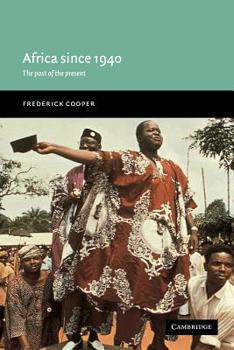Africa since 1940
Select Format
Select Condition 
Book Overview
Africa since 1940 is the flagship textbook in Cambridge University Press's New Approaches to African History series. Now revised to include the history and scholarship of Africa since the turn of the... This description may be from another edition of this product.
Format:Paperback
Language:English
ISBN:0521776007
ISBN13:9780521776004
Release Date:January 2002
Publisher:Cambridge University Press
Length:230 Pages
Weight:0.05 lbs.
Dimensions:0.6" x 6.0" x 8.9"
Customer Reviews
4 ratings
The fruits of bad institutions
Published by Thriftbooks.com User , 16 years ago
I do not know if Cooper is aware of Daron Acemonglu's work on Institutions and settler mortality. But if you take Acemonglu's work with in concert with Cooper's you have an excellent description of the problem with the African nation-state in the twentieth and twenty-first centuries. Acemonglu argues that those states that saw high settler mortality during colonization had poor institutions developed. Then, what's left is a state built purely on the extraction of raw materials. Cooper argues these states are "gatekeeper states," where the governments' number one goal is to control access to the raw materials and the outside world. Governments therefore build interest groups and political institutions to protect their own status. These coalitions can be as narrow as Mbasogo's regime in Equitatorial Guinea or as broad as the beginning of the Mugabe regime in Zimbabwe. On page 192, Cooper sums this up as, "The common thread here is not just "ethnicity," for that is a label that glosses many different phenomena and processes, but a form of politics that makes an all-or-nothing struggle for inclusion or exclusion to access to state resources conceivable." The book is a quick read. Cooper does not inundate you with facts and figures from the past 65 years of African History. But he offers enough case studies of each incident to give a convincing argument for the gatekeeper state versus other theories of the African state such as neocolonialism. Indeed Cooper is probably a good jumping off point that helps put the scholarship of Acemonglu and Gerard Padro i Miguel in a framework. Anyone interested in the workings of African states and the failure of them to create modern nation-states, whether you agree with him or not, should read this book.
Slamming the Door on the Gatekeeper State
Published by Thriftbooks.com User , 16 years ago
This deceptively slim volume contains more good ideas and insights on Africa than any other book its size. The presentation is clear if somewhat dense, with just enough data and narrative to substitute for a survey text like K. Shillington's "History of Africa." But Cooper truly grasps the pulse of major African developments over several decades. His thesis that post-1960s independence was less a watershed than post-1940 developmentalism is a breakthrough, though Africans who lived the heady early days of nationhood may well differ. The emphasis on gatekeeper states--controlling access to critical resources but generally doing little for their citizens--will secure a permanent place in the literature. Scholars and general readers alike will learn a great deal here.
Neoliberal "Gatekeeper" States
Published by Thriftbooks.com User , 17 years ago
Prior to decolonization across the African Diaspora, colonial powers in Africa claimed that their superior management, scientific knowledge, experience and financial resources enabled them to transform backward Countries, under colonial occupation, into "modern states". Such an arrogant argument, used by the North's beneficiaries of colonialism and imperialism was intended to justify the the continuation of imperialism and the new conditions of oppression in the African Diaspora. Frederick Cooper in his book, Africa Since 1940, the Past of the Present, examined the development of African States, from decolonization up to the present. Not surprisingly Cooper found that the militaries, bureaucracies and institutional structures that the former colonial powers have bequeathed to their old colonies (since independence), have created only dependent, "gatekeeper" States. Such "gatekeeper States" exist to protect the looting of their populations by their former colonial masters. Gatekeepers gain their legitimacy, after Independence, primarily through their former exploiting "mother countries" and in many cases their sovereignty is recognized more from the outside rather than from within. Cooper clarifies America's role in decolonization and the creation of the new conditions of oppression in the former colonies. Washington's policy makers, from as early as 1943, pressured European powers to decolonize Africa, but only in a superficial, incremental manner that would not result in meaningful self-determination for the people. Washington's approach to decolonization was therefore "Strategic." This strategic method was less concerned with "correctly solving the problem [of colonial oppression] than with making an advance" (or merely its appearance). Making an "advance," conceivably would pacify growing public pressure in the USA, which was emboldened by the domestic anti-colonial movement and Civil Rights movement. Cooper's book will be useful to a wide range of general readers, including students of African History, Political Science and those concerned with the failed policies of neoliberal globalization in the African Diaspora. See also: In-Dependence from Bondage: Claude McKay and Michael Manley: Defying the Ideological Clash and Policy Gaps in African Diaspora Relations
African history
Published by Thriftbooks.com User , 18 years ago
This is a well-written, comprehensive and easy to read book. I highly recommend it for a student or general reader who wants to learn about the political climate in 20th Century Africa. This book is focused on trends and yet does a good job of differentiating between the different experiences across regions and countries of Africa.





